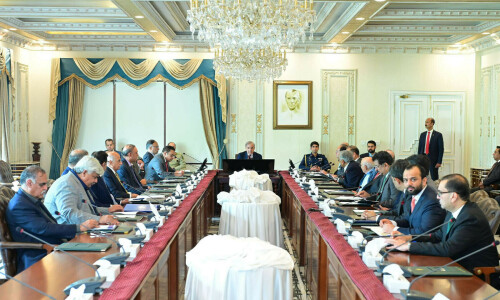IN recent years, Pakistan’s fiscal situation has deteriorated significantly due to persistently low tax revenue collection and burgeoning public expenditure.
This has led to large budget deficits year after year, while a massive debt has been accumulated in the attempt to plug the gap. The situation has had a spill-over effect on the external sector, as reflected in the recurrence of balance-of-payments crises every few years.
It is in this context that the World Bank, in its new policy note, has reiterated its ‘advice’ to the government to implement fiscal sector reforms in the next federal and provincial budgets. The objective of the suggested reforms is to cut down the consolidated fiscal deficit by boosting tax revenues, controlling expenditure, and reforming borrowing processes to limit debt accumulation.
Another goal is to enhance the efficiency and productivity of government expenditure. Fiscal sector reforms play a crucial role in increasing national savings and investment. India understood the import of the fiscal sector for macroeconomic management and started the reforms process after its 1991 economic crisis.
Consequently, it has attracted massive domestic and foreign investment. It has not had to seek another IMF bailout and is now the world’s third-largest economy.
However, the latest policy note is different from the earlier ones as it calls for the participation of Pakistan’s provinces — as equal stakeholders — in this reform process for stronger inter-government coordination on fiscal issues. Therefore, the bank wants a national fiscal policy that aligns both the federal and provincial tax effort and spending framework in line with the constitutional mandate.
“Implement the new Fiscal Responsibility and Debt Limitation Acts at the federal and provincial levels, including through development and implementation of a national medium-term fiscal framework through the FY25 budget process,” the bank told the government.
The suggested reforms, needed to create room for growth-oriented spending, are expected to be made part of a new and bigger medium-term IMF programme that the finance minister will be discussing with the Fund on the sidelines of the World Bank-IMF meetings in Washington next week.
As the prime minister has warned multiple times of late, the next IMF programme will be far tougher than any other Pakistan has embarked on in the past; it will focus on fiscal and external sector reforms for recovery and growth.
Given the country’s extremely vulnerable external position, which has forced the government in the last two years to restrict imports and contract economic growth to avert a sovereign default, the next IMF programme is expected widely to be extremely tough in terms of both the speed of required adjustments and the structural reform goals under it.
These targets will be difficult for the centre to attain without provincial buy-in and ownership of reforms.
Published in Dawn, April 9th, 2024














































Dear visitor, the comments section is undergoing an overhaul and will return soon.